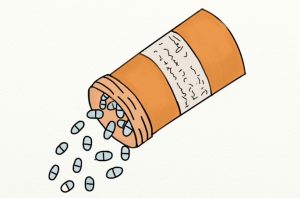The US should not impose price controls on pharmaceuticals
February 24, 2019
It’s no secret that prescription drug prices are high in the US. However, price controls, or the imposition of a price cap on prescription pharmaceuticals sold in the United States, are not the solution.
Generic medicines, cheaper versions of well-known brand name drugs, are currently the most affordable way for Americans to get access to medication. Forbes notes in 2017 that generics make up 90% of all drugs sold in the US and are significantly cheaper in the US than in countries with price controls.
Another Forbes article from 2018 explains why: price controls would destroy the generics industry because generics operate on a razor-thin profit margin, so they barely bring in more money than it costs to produce them. If pharmaceutical companies are facing a revenue squeeze from price controls, they will double down on their products that bring in money. Generics would either no longer be produced or their prices would be significantly raised. Either way, the poorest in the US would no longer be able to access generic medicines.
It’s also important to realize that prices are high for a reason. Current levels of revenue for pharmaceutical companies are predominantly driven by only a few drugs. A study published by Texas A&M in 2017 found that 80% of drugs developed by pharmaceutical companies don’t make back the money that was spent to develop them. At the same time, a few “blockbuster” drugs make billions of dollars. This means that price controls are uniquely harmful because they constrain the only drugs that are actually making pharmaceutical companies money.
The companies need this revenue because the innovation of pharmaceuticals is exorbitantly expensive. A USC study from 2018 estimates that bringing a drug to market costs $2.5 billion, so higher expected revenues directly translate to more drug discovery. By imposing price controls, the government would be killing innovation of new drugs, effectively sentencing people with diseases that lack good treatments to suffering indefinitely.
These findings are supported empirically as well. The National Bureau of Economic Research found in 2007 that cutting drug prices in the US by 40-50% would lead to a 30-60% decrease in the number of research and development projects that pharmaceutical companies undertake.
Overall, the New York Times noted in 2015 that because effective new pharmaceutical drugs bring great benefit to patients, four-fifths of the value from new drugs goes to patients while only one-fifth goes to pharmaceutical companies. Rather than constraining the pharmaceutical industry, the only effect that price controls will have is hurting consumers.
Innovation of new drugs is the key to making healthcare more affordable. Frank Lichtenberg, a business professor at Columbia University, found in 2013 that new drugs decrease overall healthcare costs by cutting down on hospital stays. For every dollar spent on innovative medicines, there is a $7.20 reduction in healthcare spending.
In fact, this doesn’t only hurt Americans, it hurts the entire world. The Journal of Law and Economics quantified in 2005 that if the US had imposed price controls on pharmaceuticals, 38% of all new drugs globally would have been lost. Price controls in the United States would foreclose the opportunity for everybody around the world to get access to life-saving treatments that haven’t yet been developed.
Price cuts in the United States would be especially harmful to the developing world. The Harvard College Global Health Review notes that pharmaceutical companies practice price discrimination across different countries, meaning they choose prices based on how much each country is able to pay. In this way, low-income countries get access to crucial medications because high-income countries, such as the United States, are effectively able to foot the bill for them.
In recent years, high prices in the US specifically have become exceedingly important, because nearly every other high-income country has imposed price controls. If the US follows suit, the developing world will lose access to medications. The Minnesota Law Review explains in 2018 that high prices in the US make pharmaceutical companies willing and able to offer low prices to low-income countries, meaning the government has an obligation to consider that imposing price controls would take treatment options away from people living in the most impoverished areas of the world.
For just one example of this, the same USC study from before concludes that 20.9 million people in the developing world have access to breakthrough HIV medicines because of high American drug prices.
While price controls may make sense in theory, in practice they would only hurt the poorest in the US and around the world, while stifling innovation of much-needed new medicines for everyone.



Chris Rofidal • Feb 24, 2019 at 7:36 pm
Both perspectives touch only on the pharmaceutical companies role in drug pricing. I felt the both pieces are very well researched, however there are multiple stakeholders to be held accountable for responsible drug pricing..not just the innovating drug companies…